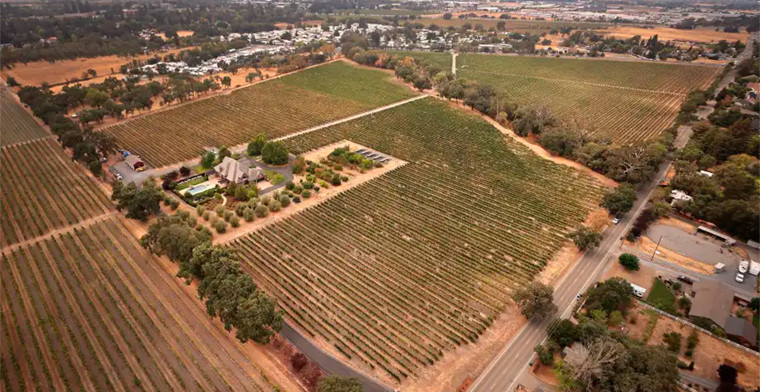California: Judge Directs Federal Government to Remove Koi Nation Land from Trust, Halting Casino Plans
Tuesday 30 de September 2025 / 12:00
2 minutos de lectura
(California).- A federal judge has ruled that a 68-acre site designated for the Koi Nation of Northern California must lose its trust status, effectively ending the tribe’s four-year effort to build a large-scale casino near Windsor in Sonoma County.

The Sept. 22 ruling, which finalizes a determination made by the same judge earlier in the month, was a significant legal victory for the Federated Indians of Graton Rancheria, whose fight against a potential rival for in the gaming business — roughly 11 miles north of their own Graton Resort & Casino near Rohnert Park, the Bay Area’s largest gaming complex — had escalated in the past year.
And it was a huge setback for the Koi, who have represented the project as the clearest path of financial viability for their small band of Pomo Indians.
“The Koi Nation has fought for generations for a land base upon which to secure a future for the Koi people,” the tribe said in a written statement to The Press Democrat. The “order removing our restored homeland from trust status is deeply disappointing, though our resolve is unwavering: we will continue to fight for justice through our appeal to the Ninth Circuit.
The Koi filed that motion Sept. 11, following Judge Rita F. Lin’s preliminary determination in favor of Graton Rancheria, which found that U.S. Department of Interior had “railroaded the (Graton) tribe at every turn” in its approval of the Koi land-to-trust request.
“In the end, we are confident that justice will prevail through our appeal,” the Koi wrote.
The tribe called the federal government’s original decision to place the 68-acre parcel into trust “thorough, meticulous, and lawful in every respect.”
“The record includes volumes of technical, scientific, and historical data supporting that decision,” the tribe added.
A land-into-trust agreement is a crucial step on the way to any tribal casino opening.
Graton Rancheria first sued to halt the project last November, arguing in the U.S. District Court for the Northern District of California that the Interior Department had not provided them and other local tribes an adequate opportunity to consult on the site’s inventory of cultural resources. Graton sued again in February, a month after then-Interior Secretary Deb Haaland, in the final hours of the Biden administration, approved the Koi’s land-to-trust agreement.
By the time Graton Rancheria’s second lawsuit was filed, Doug Burgum was the new interior secretary under President Donald Trump. Burgum’s agency swiftly overturned a fee-to-trust agreement Haaland had granted to the Scotts Valley Band of Pomo Indians for a chunk of land in Vallejo, in a case that involved many of the same core issues. But he didn’t budge on Haaland’s approval of the Koi project.
Lin did that in court, siding with Graton Rancheria, a powerful player in California’s gaming industry that this summer hit the latest phase of a $1 billion expansion of its casino-resort near Rohnert Park.
After her initial decision this month, the judge directed the two sides in the case to meet, and to jointly propose a final judgment reflecting her order.
True to form in the contentious saga, they were unable to come to an agreement. So Lin examined proposed orders submitted by each side and sided with Graton.
The ruling emphasized several Graton claims granted by Lin, including assertions that Interior violated federal law by failing to consult with the tribe on the Shiloh parcel, which is within its ancestral territory; improperly concluded the Koi have significant historical connections to that land; and had a Bureau of Indian Education official consent to the land-to-trust agreement without the authority to do so. The judge had sided with the government on other points of law.
But the Koi also lost on another, major front. The proposed order written by Burgum’s acting assistant attorney general, Adam Gustafson, argued that the judge’s determination didn’t mean the land had to be taken out of trust. Gustafson noted that the Koi had promised in writing not to “undertake any casino development” during their appeal.
The Koi Nation purchased the Shiloh neighborhood parcel in September 2021, for $12.3 million. The property remains theirs. But the ability to build a casino at the site is gone, at least for now.
Graton Rancheria won’t have to celebrate the decision alone. A large majority of Shiloh residents have flooded public comment periods with their concerns about traffic, noise, crime, light pollution, water usage and, most of all, the increased danger they say a big casino would pose during wildfire evacuations, in an area with few routes of egress.
Those unhappy residents were joined by a wide range of elected officials opposing the project, from the Windsor Town Council to the Sonoma County Board of Supervisors, state and federal office holders, and Gov. Gavin Newsom.
The Koi are seeking to build a 400-room hotel and a 530,000-square-foot gambling floor in Shiloh, with 2,750 gaming devices and more than 100 table games.
Lin rejected that argument.
“FIGR has met its burden for the requested injunctive relief reversing the land-into-trust transaction,” the approved order reads.
Categoría:Legislation
Tags: Sin tags
País: United States
Región: North America
Event
iGaming Club Conference Cancun
24 de November 2025
Levon Nikoghosyan Confirms iGaming Cancun’s Success and Future LATAM Expansion
(Cancun, SoloAzar Exclusive).- The vibrant energy of iGaming Cancun has set the tone for a new chapter in the Latin American iGaming industry. Levon Nikoghosyan, CEO and Co-Founder of AffPapa and iGaming Club, shared his enthusiasm for the event’s debut in Mexico, highlighting its impact on the regional market and the company’s ambitious plans for the future.
Thursday 04 Dec 2025 / 12:00
iGaming Club Cancún 2025 Concludes Successfully with Strong Connections in Its First LatAm Edition
(Cancun, SoloAzar Exclusive).- iGaming Club Cancún 2025 came to a close last night with a comprehensive experience of conferences, networking, and the AffPapa iGaming Awards LATAM gala, consolidating itself as a unique space for operators, affiliates, and providers in the region.
Thursday 27 Nov 2025 / 12:00
iGaming Club Cancún 2025: Affiliates, Operators, and Innovation Take Center Stage on Final Day
(Cancun, SoloAzar Exclusive).- The second and final day of iGaming Club Cancún 2025 unfolds today, bringing together operators, affiliates, and select B2B providers in a unique networking and conference environment that highlights the evolving dynamics of the Latin American iGaming market.
Wednesday 26 Nov 2025 / 12:00
SUSCRIBIRSE
Para suscribirse a nuestro newsletter, complete sus datos
Reciba todo el contenido más reciente en su correo electrónico varias veces al mes.




















